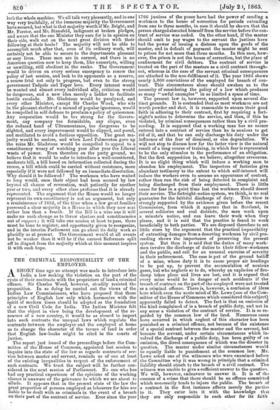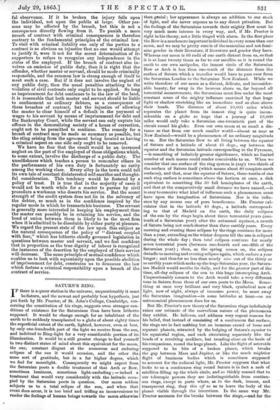THE CRIMINAL RESPONSIBILITY OF THE EMPLOYED.
ASHORT time ago an attempt was made to introduce into India a law making the violation on the part of the ryots of their contracts with the proprietors of land a criminal offence. Sir Charles Wood, however, steadily resisted 'the proposition. In so doing he carried out the views of the Indian Law Commissioners, who have proposed that those principles of English law only which harmonize with the spirit of modern times should be adopted as the foundation of a new Civil Code for India. The Indian Minister felt that the object in view, being the development of the re- sources of a new country, it would be us absurd to import into such contracts the unequal laws which regulate the contracts between the employer and the employed at home as to change the character of the tenure of land in order that English law-books might be cited in the courts of justice. The report just issued of the proceedings before the Com- mittee of the House of Commons, appointed last session to inquire into the state of the law as regards contracts of eer- vice between master and servant, reminds us of one at least of the existing inequalities in respect of the enforcement of such contracts. We trust the subject will be further con- sidered in the next session of Parliament. No one who has had any practical experience of the opinions of the working classes is unaware of the grievance to which we are about to allude. It appears that in the present state of the law the great proportion of persons employed as labourers for hire are liable to be dealt with as criminals in the event of a breach on their part of the contract of service. Ever since the year
1766 justices of the peace have had the power of sending a workman to the house of correction for periods extending from one to three months, in case it should be shown that the person chargedabsented himself from the service before the con- tract of service was ended. On the other hand, if the master should omit to pay wages to the servant the justices have had the power of issuing a distress upon the goods of the master, and in default of payment the master might be sent to prison for not more than three months. In this case, how-' ever, the prison is not the house of correction, bat the place of confinement for civil debtors. The contract of service is treated on the part of the masters as a civil contract through- out, whereas in the ease of the servant criminal consequences are attached to the non-fulfilment of it. The year 1863 shows nearly 5,000 convictions of the employed for breach of con- tract. This circumstance alone should awaken us to the necessity of' considering the policy of a law which produces' so many "awful examples" in so limited a space of time.
The present law is, however, supported upon several dis- tinct grounds. It is contended that as most workmen are not worth powder and shot, it is reasonable to ensure their good faith in adhering to their contract, first by requiring a fort- night's notice to determine the service, and then, if this be violated, by criminal consequences rather than by a civil pro- ceeding. It is supposed that a working man has no sooner entered into a contract of service than he is anxious to get rid of it, and that he can only discharge his duty under the influence of the fear of dismissal, or else degradation. We will not stop to discuss how far the latter view is the natural result of a long course of training, in which fear is represented to be the only stimulus to the performance of an obligation. But the first supposition is, we believe, altogether erroneous. It is no slight thing which will induce a working man to abandon his employment. The inspectors of factories give abundant testimony to the extent to which self-interest will . induce the workers even to assume an appearance of content, rather than run the risk of being detected in complaint and being discharged from their employment. There is little cause for fear in a quiet time lest the workmen should desert their service. The fortnight-notice system, we think, is no real guarantee for the faithful discharge of duty. This view is strongly supported by the evidence given before the recent Commission, from which it appears that in Scotland, in several collieries and coal districts, the men work upon a minute's notice, and can leave their work when they please, and it is said that the practice is found to work beneficially to both parties. We are disposed therefore to set little store by the argument that the practical impossibility Of extracting damages from a deserting workman by civil pro- ceeding shows the importance of preserving the present system. But then it is said that the duties of many work- men involve the discharge of duties to their fellow-workmen and the public, and call for an unusual exercise of severity in their enforcement. The case is put of the ground bailiff of a mine, whose duty it is to cause proper air headings to be put up, to prevent the accumulation of noxious gases, but who neglects so to do, whereby an explosion of fire- damp takes place and lives are lost, and it is argued that every mine would be in danger of such accidents if the breach of contract on the part of the employed were not treated as a criminal offence. There is, however, a confusion of ideas here which even the acute mind of Mr. Lowe (one of the Com- mittee of the House of Commons which considered this subject) apparently failed to detect. The fact is that an omission of the kind complained of is a breach of public duty, and not in any sense a violation of the contract of service. It is so re- garded by the common law of the land. Numerous cases have occurred in which neglect of this character has been punished as a criminal offence, not because of the existence of a special contract between the master and the servant, but because the servant, under certain circumstances which in- volved the discharge of a public duty, has been guilty of an omission, the direct consequence of which was the disaster in question. The master under similar circumstances would be equally liable to punishment at the common law. Mr. Lowe asked one of the witnesses who were examined before the Committee why it was wrong in principle that a criminal liability should attach to the breach of a civil contract. The witness was unable to give a sufficient answer to the question. We will, however, endeavour to answer it. It is of the essence of a crime that there should be an offence committed which necessarily tends to injure the public. The breach of a contract in the first instance affects merely the parties to it. They enter into it with the knowledge that they are only responsible to each other for its faith
•
ful observance. If it be broken the injury falls upon the individual, not upon the publio at large. Other per- sons may be affected by the breach, but this is not a consequence directly flowing from it. To punish a mere breach of contract with criminal consequences is therefore contrary to the fundamental principles of the criminal law. To visit with criminal liability one only of the parties to a contract is so obvious an injustice that no one would attempt to justify it, were it not for the secret determination of its supporters to refuse to recognize any independence in the status of the employed. If the breach of contract also in- volves an omission of public duty, then it is right that the offender, whether master or servant, should be made criminally responsible, and the common law is strong enough of itself to meet such a case. But if it does not involve the neglect of any public duty, then the usual penalties attaching to the violation of civil contracts only ought to be applied. So long as imprisonment for debt continues to be the law of the land, it is reasonable that both master and servant should be liable to confinement as ordinary debtors, as a consequence of these breaches of contract, but the injustice of allowing the master to clear himself of a default in the payment of wages to his servant by means of imprisonment for debt and the Bankruptcy Court, while the servant can only expiate his offence in the demoralizing society of a house of correction, ought not to be permitted to continue. The remedy for a breach of contract may be made as summary as possible, but the sting arising from the agreement being treated as having a criminal aspect on one side only ought to be removed.
We have no fear that the result would be an increased neglect on the part of the employed of those obligations which, to some extent, involve the discharge of a public duty. The unselfishness which teaches a person to remember others in the performance of his own duty is fortunately no rarity among the working class. Every alley in the town could tell its own tale of constant disinterested self-sacrifice and thought- ful consideration. This tendency would be fostered by a policy of trust. It is true that in the majority of cases it would not be worth while for a master to pursue by civil procedure a workman who deserts his service. But the secret strength of the credit system. does not lie in the solvency of the debtor, so much as in the confidence inspired by the regular mode in which he transacts his business. The servant is generally more interested in keeping his employment than the master can possibly be in retaining his service, and the bond of union between them is likely to be the most firm when it is admitted to be dissoluble by either party at pleasure. We regard the present state of the law upon this subject as the natural consequence of the policy of "distrust, coupled with fear," which has hitherto chiefly governed legislation in questions between master and servant, and we feel confident that in proportion as the true dignity of labour is recognized the instances of the desertion by the employed of their service will decrease. The same principle of mutual confidence which enables us to look with equanimity upon the possible abolition of imprisonment for debt, constrains us to denounce the law which fastens a criminal responsibility upon a breach of the contract of service.































 Previous page
Previous page